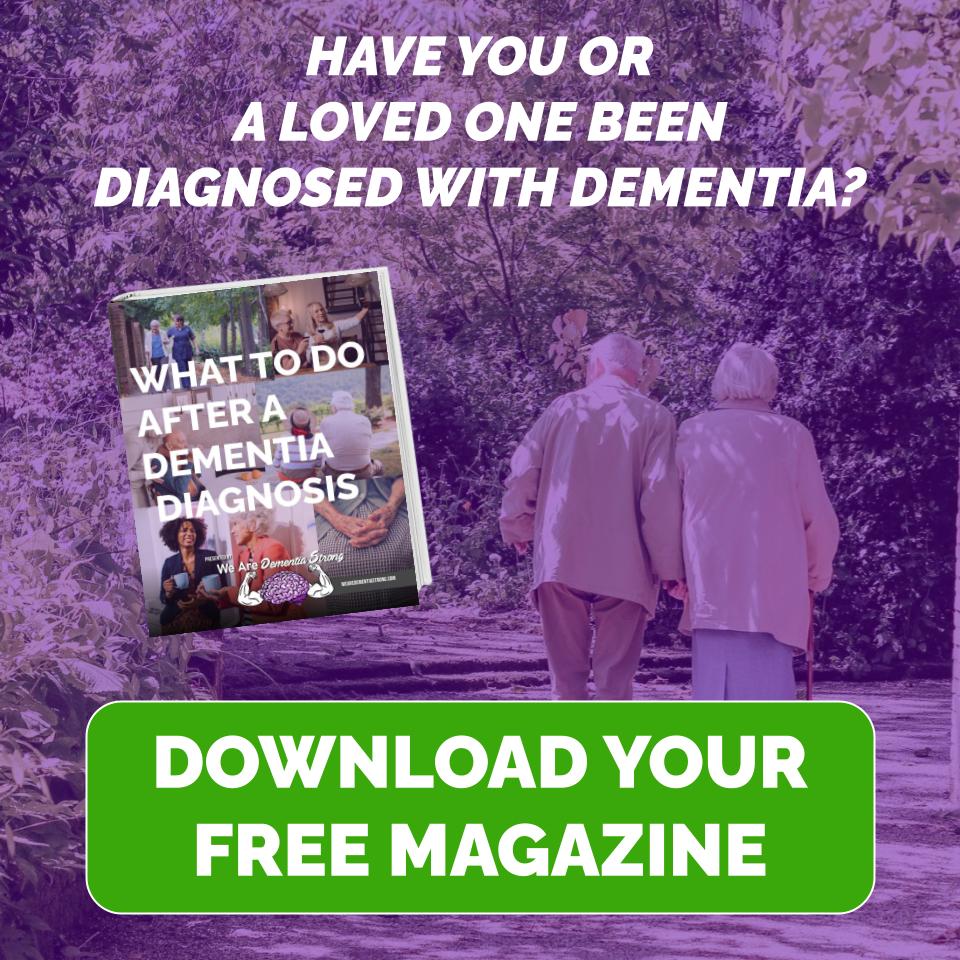Dementia is More Than Memory Loss
A few weeks back, Brian wrote here about his recent bout with aphasia. It was a living nightmare. And even though it lasted only a day, his ability to speak, to communicate, a part of his very being, was trapped indefinitely in a box. Could you imagine? You see, many people equate diseases like Brian’s Alzheimer’s and vascular dementia only with memory loss. But dementia is so much more than that.
Brian is my life partner and care partner. We walk this dementia journey together. Sure, memory loss is a big part of it. I’ve witnessed his memories regress steadily through our years together, and our life-care plan involves a lot of daily reminders and motivations to help Brian do everything from managing his blog to showering to eating.
Those are just daily steps. Some days are good. Some are bad, but for more reasons than just memory loss. Different types of dementia and their various stages bring all sorts of conditions and emotional states. Mood swings. Hallucinations and other vision impairments. Communication difficulties. Disorientation with time and space. Inability to focus. Confusion. They all have a face and a name beyond forgetfulness.
Symptoms of Dementia Beyond Memory Loss
As dementia progresses to the mid- and late stages, changes in brain function and cognitive ability may become more pronounced and frequent. With Brian, one day may bring wild hallucinations while the next places him in a place he calls “the nothingness,” where a fog overcomes him and his sensory perceptions are almost nonexistent.
Here’s an explanation of some common symptoms persons living with dementia and their care partners experience:
Emotional Changes
People with dementia may often become moody and agitated. They often don’t know why. Sometimes, pure frustration causes their distress and anxiety. They may be upset they can’t express themselves clearly, recognize familiar faces and things, or complete a simple task.
Mood swings, a familiar calling card of Brian’s vascular dementia, may also have no understandable source. Irritability can be simply biological. Dementia in its essence is a systematic destruction of brain cells. When nerve cells misfire or disconnect in areas of the brain governing emotion, the emotional roller coaster begins a rapid journey of ups and downs beyond control.
Hallucinations and Other Sensory Misperceptions
Persons living with dementia may report seeing, hearing or feeling something that’s not there. They may see a face or a mysterious figure lurking in a dark shadow (insert feelings of paranoia here). They may even see or feel small critters crawling on or near them. Sometimes hallucinations could be random shapes or foggy areas clouding their vision. Your loved one may also report seeing people and pets from their past.
Couple these visual misperceptions with sensory overload — perhaps the sound of whooshing branches in the wind or a microwave running in the next room — and your loved one could feel particularly anxious or paranoid.
Again, hallucinations stem from damaged and misfiring neurons. But what they see and feel is very real to them. It’s important to acknowledge and validate their reports. Arguing that a hallucination doesn’t exist does nothing to quell fear and confusion. Sometimes calmly reorienting the conversation to focus on something else or a change of location (away from overwhelming stimuli) can bring your loved one back to reality.
Inability to Focus
For many individuals with dementia, focusing on a certain subject or task may be very difficult. Even in early stages, they may be unable to follow a recipe they know by heart, to focus on reading, or to finish a routine household chore. Did they mix in that ingredient? Did they already read that passage? Did they move over the laundry? Losing track of the steps can cause confusion and indecision that can hinder even the simplest of processes.
In mid- to late stages, losing focus can affect every aspect of life. Your loved one may no longer be able to drive because they can’t focus on the road, traffic markers and familiar routes. They may need assistance with personal hygiene and other elements of self-care. Does memory loss have something to do with this? Yes, but dementia’s common regressions in attentiveness are a distinct neurological symptom.
Difficulty Communicating
I earlier mentioned Brian’s aphasia. A common dementia-related illness, aphasia attacks one’s linguistic abilities like talking, writing or comprehending their own language. Brian’s longest battle with aphasia lasted six months — thankfully he has mastered his talk-to-text app and likes to argue through Alexa and Siri, but I digress.
Communication difficulties associated with dementia may be more subtle. Your loved one may struggle with finding the right words or completing a sentence. Their thought train may be rolling without a hitch, but they then halt after “losing it.”
Thankfully, humans can communicate in a variety of ways. Eyes can point out things we want or need. Facial expressions can signal emotion quite powerfully. Persons living with dementia may even hum a tune or grunt to convey meaning. We, as care partners, must be patient, attentive and follow the clues our loved ones give.
Disorientation and Poor Coordination
Even the healthiest among us can become easily disoriented or clumsy, at times. Now imagine functioning with regressing brain function. Individuals with dementia often struggle to pinpoint their location in relation to nearby objects, from one room to the next, or most notably, from somewhere else to home.
Around the house, they may struggle with depth perception, increasing risks for both minor and major injuries from falls. As your loved one progresses through the stages of dementia, they may need assistance navigating an environment more tailored to their safety. Strong lighting and easy accessibility to things they need are helpful.
Regressions in Reasoning and Judgment
Dementia also attacks strong judgment and ability to reason toward logical conclusions. A person may no longer make good decisions about their own physical health and financial well-being. Often, their mind is active in a previous year — or decade — and may be operating under outdated thoughts and processes. Their judgment may be reckless or dangerous, even in early stages, while operating a vehicle or watching a youngster.
As with any of these dementia symptoms, reasoning and judgment regressions require compassionate understanding and mindful monitoring. (Helpful hint: If you discuss building a good life-care plan with your elder early, you can prepare for care partners to help with important decision-making like banking and transportation.)
#WeAreDementiaStrong. We Can Help Plan for Dementia Beyond Memory Loss
#WeAreDementiaStrong. If you need help, Caregiver Support and Resources, LLC has over 25 years of experience with all aspects of life-care planning including dementia care. We’re happy to provide referrals and guide the process in a caring and compassionate way.



